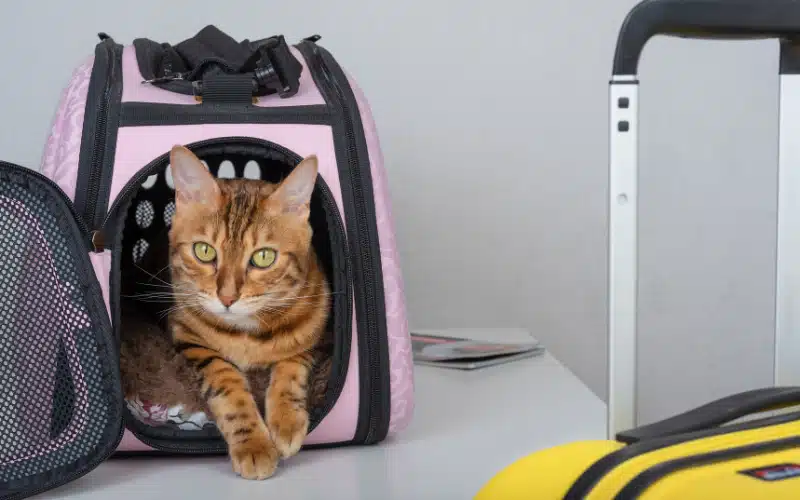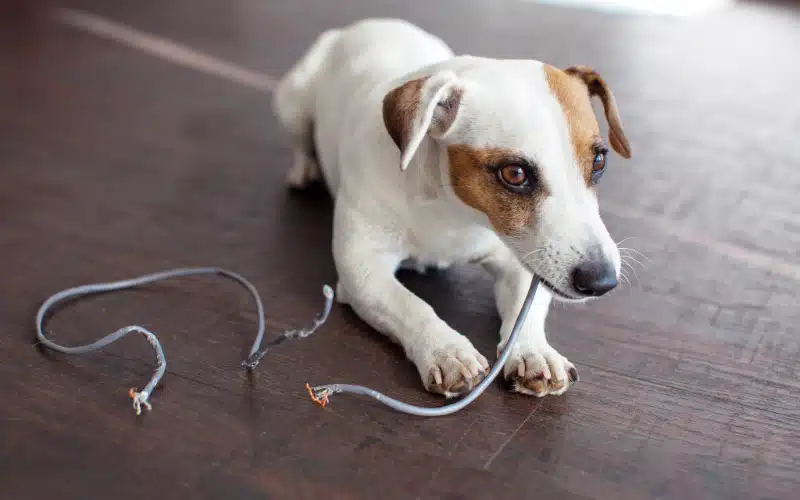
Road Tripping or Flying High: Pet Travel Safety
This past holiday travel season may have you cringing about future trip planning, but the New Year still beckons us to look ahead to new adventures, and what better way than by planning a road trip? If you’re considering bringing your pet along, so much the better! January includes National Pet Travel Safety Day, so a few safety precautions should be taken when the open road calls to you and your pet. Keep these pet travel safety tips in mind as you pack and travel, and ensure you and your pet both have the vacation you deserve.
ID Tags and Microchips
When preparing your pet for a family vacation, you’ll want to ensure they wear a collar with proper ID tags. Your pet likely won’t leave your side during your trip. Still, you’ll want to ensure their identification is apparent in case your pet runs off or gets separated from you for any reason.
However, collars can and do come off. For this reason, we recommend you have your pet microchipped (if they aren’t already) and double-check that the chip is registered with the microchip company and that they have your current contact information. If your pet is not yet microchipped, call your primary care veterinarian to schedule this easy procedure. If your pet has a chip, there’s no better time to jump online and ensure your contact information is current.
Packing for Your Pet
Just as you need a few comforts from home, so does your pet. Here are a few of the things you’ll want to pack for your pet’s vacation:
- Food and water (pack extra)
- Collapsible food and water bowls
- Bed
- Collar and leash (plus an extra set)
- Toys
- Medications, supplements, and medical records
- A current photo of your pet
- A list of local veterinary hospitals, including emergency pet hospitals
- Crate or travel carrier
- Litter box, scoop, litter, and disposal bags
- Towels or rags for drying muddy paws
- Brush and grooming supplies
- Baby wipes and potty pads for easy clean-up
- Pet first aid kit stocked with the essentials
If your pet takes any medications, double-check that you won’t run out on your trip. Call your family veterinarian well in advance of your departure to request refills, as many offices require 24-48 hours to refill medications.
Vaccinations, Health Certificates, and Airline Travel
Your pet should be up to date on all vaccinations before you leave on vacation. Some states require you to carry proof of vaccination when driving between state borders, and you’ll need a health certificate from a veterinarian dated no less than ten days before your departure if you are traveling out of the country, including to Mexico or Canada. If traveling internationally, contact the Foreign Consulate of the country you plan to visit at least 4 weeks in advance of your trip for their guidance.
Hawaii has specific requirements, including quarantine, so check the state guidelines for more details and talk to your regular veterinarian if you plan an island vacation.
If you are traveling by airplane, a few extra steps are needed. Review your airline’s guidelines for travel with pets well before your trip, as each company has different regulations for traveling with pets.
Lastly, check with your veterinarian to ensure that your pet is current on flea, tick, heartworm, and intestinal parasite preventives to be safe from infectious diseases and parasites while you travel. Different regions of the country have higher or lower prevalence of those pesky bugs!
Car Travel and Motion Sickness
Limiting the time your pet rides with their head out of the windows is essential for car travelers. Prolonged exposure to rapidly moving air and debris such as grass, pollen, and dust can cause eye, ear, and throat irritation. Pets should always wear a harness and be held by an adult if you allow them to have their head out the window. Sadly, we have treated many pets for falling out of moving car windows so these precautions are necessary to ensure your pet’s safety. A little bit is ok, but keep a close eye (or hold) on your pet in the car.
If your pet experiences motion sickness, give your veterinarian a call before your departure to discuss certain medications that may help alleviate any tummy trouble and make the trip more bearable for your pet (and for you!).
Proper Car Restraints
An unrestrained pet in the car can cause serious safety problems during a road trip, such as jumping onto the driver’s lap or moving between seats while traveling down the interstate.
To keep your family and your pet safe, restrain your pet with a harness and pet car seat, or keep your pet in a securely anchored pet carrier or travel crate while driving. Be sure to research the best options depending on your pet’s size, age, and breed, and don’t hesitate to call us with any questions.
Rest Stops and Water Breaks
Plan for plenty of rest stops to allow your pet outside to drink water, stretch their legs, and go to the bathroom.
Taking your pet for a short walk at the rest stop is an excellent way to keep your pet happy and alleviate stress from the car, making the trip much more enjoyable. Research dog parks and other dog-friendly stops for your canine friend, which can allow them to burn off some excess energy and experience the smells of somewhere new.
If most of your travel will be by car, it’s important to mention that you should never leave your pet alone in a parked vehicle. Even with mild temperatures outside, the internal temperature of a car can easily become dangerously cold, putting your pet at risk for hypothermia, or hot (heatstroke). If you need to spend the day sightseeing in a less-than-pet-friendly spot, check to see if there is a doggy daycare or boarding facility nearby where your pet can spend the day instead.
Your pet will love the chance to accompany you and your family on your vacation, especially if the time spent traveling is peaceful and relaxing. Please don’t hesitate to call us if you need assistance while you are in town for the winter (talking to you, snowbirds) and with any questions or concerns about your pet’s safety. Animal Emergency Hospital Volusia wishes you safe travels!
Enjoy your trip!



